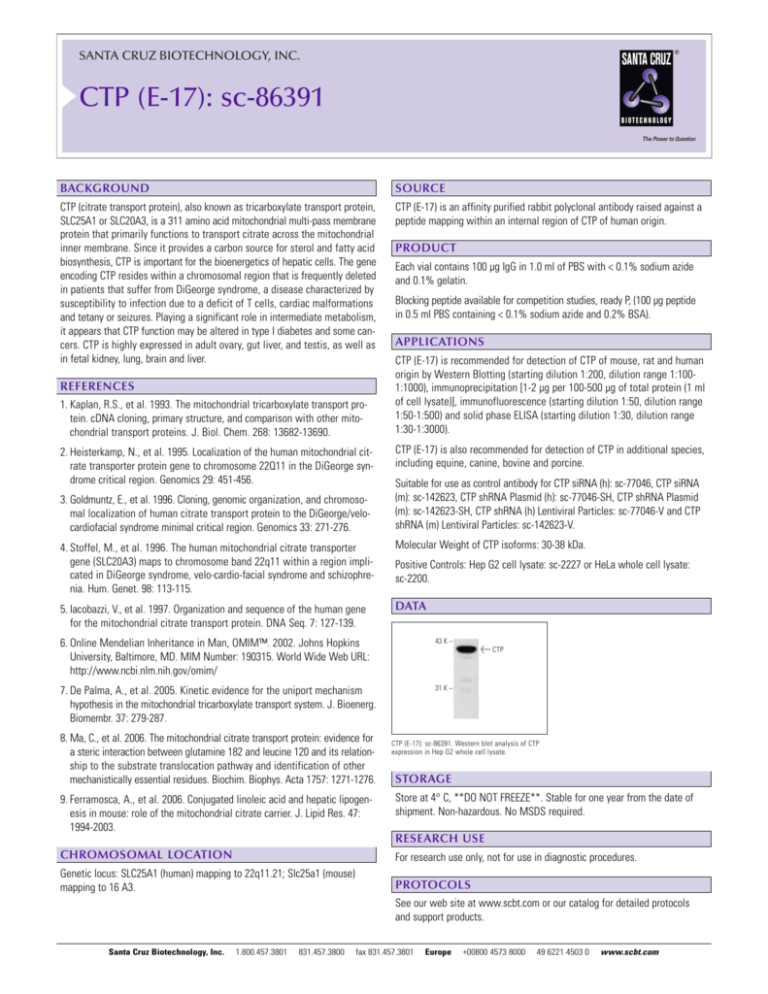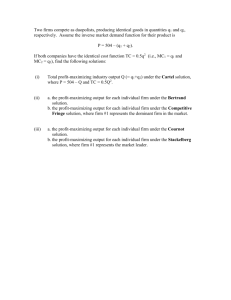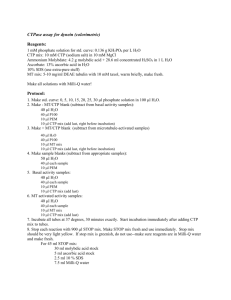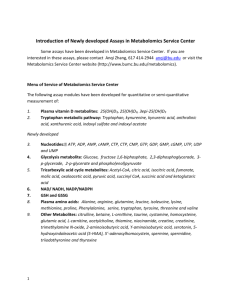CTP (E-17): sc-86391 - Santa Cruz Biotechnology
advertisement

SANTA CRUZ BIOTECHNOLOGY, INC. CTP (E-17): sc-86391 BACKGROUND SOURCE CTP (citrate transport protein), also known as tricarboxylate transport protein, SLC25A1 or SLC20A3, is a 311 amino acid mitochondrial multi-pass membrane protein that primarily functions to transport citrate across the mitochondrial inner membrane. Since it provides a carbon source for sterol and fatty acid biosynthesis, CTP is important for the bioenergetics of hepatic cells. The gene encoding CTP resides within a chromosomal region that is frequently deleted in patients that suffer from DiGeorge syndrome, a disease characterized by susceptibility to infection due to a deficit of T cells, cardiac malformations and tetany or seizures. Playing a significant role in intermediate metabolism, it appears that CTP function may be altered in type I diabetes and some cancers. CTP is highly expressed in adult ovary, gut liver, and testis, as well as in fetal kidney, lung, brain and liver. CTP (E-17) is an affinity purified rabbit polyclonal antibody raised against a peptide mapping within an internal region of CTP of human origin. REFERENCES 1. Kaplan, R.S., et al. 1993. The mitochondrial tricarboxylate transport protein. cDNA cloning, primary structure, and comparison with other mitochondrial transport proteins. J. Biol. Chem. 268: 13682-13690. 2. Heisterkamp, N., et al. 1995. Localization of the human mitochondrial citrate transporter protein gene to chromosome 22Q11 in the DiGeorge syndrome critical region. Genomics 29: 451-456. 3. Goldmuntz, E., et al. 1996. Cloning, genomic organization, and chromosomal localization of human citrate transport protein to the DiGeorge/velocardiofacial syndrome minimal critical region. Genomics 33: 271-276. PRODUCT Each vial contains 100 µg IgG in 1.0 ml of PBS with < 0.1% sodium azide and 0.1% gelatin. Blocking peptide available for competition studies, ready P, (100 µg peptide in 0.5 ml PBS containing < 0.1% sodium azide and 0.2% BSA). APPLICATIONS CTP (E-17) is recommended for detection of CTP of mouse, rat and human origin by Western Blotting (starting dilution 1:200, dilution range 1:1001:1000), immunoprecipitation [1-2 µg per 100-500 µg of total protein (1 ml of cell lysate)], immunofluorescence (starting dilution 1:50, dilution range 1:50-1:500) and solid phase ELISA (starting dilution 1:30, dilution range 1:30-1:3000). CTP (E-17) is also recommended for detection of CTP in additional species, including equine, canine, bovine and porcine. Suitable for use as control antibody for CTP siRNA (h): sc-77046, CTP siRNA (m): sc-142623, CTP shRNA Plasmid (h): sc-77046-SH, CTP shRNA Plasmid (m): sc-142623-SH, CTP shRNA (h) Lentiviral Particles: sc-77046-V and CTP shRNA (m) Lentiviral Particles: sc-142623-V. 4. Stoffel, M., et al. 1996. The human mitochondrial citrate transporter gene (SLC20A3) maps to chromosome band 22q11 within a region implicated in DiGeorge syndrome, velo-cardio-facial syndrome and schizophrenia. Hum. Genet. 98: 113-115. Molecular Weight of CTP isoforms: 30-38 kDa. 5. Iacobazzi, V., et al. 1997. Organization and sequence of the human gene for the mitochondrial citrate transport protein. DNA Seq. 7: 127-139. DATA Positive Controls: Hep G2 cell lysate: sc-2227 or HeLa whole cell lysate: sc-2200. 6. Online Mendelian Inheritance in Man, OMIM™. 2002. Johns Hopkins University, Baltimore, MD. MIM Number: 190315. World Wide Web URL: http://www.ncbi.nlm.nih.gov/omim/ 43 K – 7. De Palma, A., et al. 2005. Kinetic evidence for the uniport mechanism hypothesis in the mitochondrial tricarboxylate transport system. J. Bioenerg. Biomembr. 37: 279-287. 31 K – 8. Ma, C., et al. 2006. The mitochondrial citrate transport protein: evidence for a steric interaction between glutamine 182 and leucine 120 and its relationship to the substrate translocation pathway and identification of other mechanistically essential residues. Biochim. Biophys. Acta 1757: 1271-1276. 9. Ferramosca, A., et al. 2006. Conjugated linoleic acid and hepatic lipogenesis in mouse: role of the mitochondrial citrate carrier. J. Lipid Res. 47: 1994-2003. < CTP CTP (E-17): sc-86391. Western blot analysis of CTP expression in Hep G2 whole cell lysate. STORAGE Store at 4° C, **DO NOT FREEZE**. Stable for one year from the date of shipment. Non-hazardous. No MSDS required. RESEARCH USE CHROMOSOMAL LOCATION For research use only, not for use in diagnostic procedures. Genetic locus: SLC25A1 (human) mapping to 22q11.21; Slc25a1 (mouse) mapping to 16 A3. PROTOCOLS See our web site at www.scbt.com or our catalog for detailed protocols and support products. Santa Cruz Biotechnology, Inc. 1.800.457.3801 831.457.3800 fax 831.457.3801 Europe +00800 4573 8000 49 6221 4503 0 www.scbt.com







